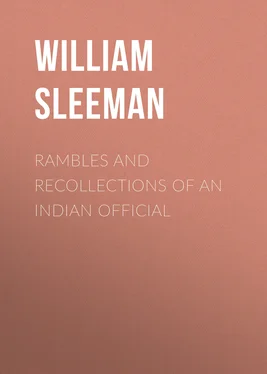William Sleeman - Rambles and Recollections of an Indian Official
Здесь есть возможность читать онлайн «William Sleeman - Rambles and Recollections of an Indian Official» — ознакомительный отрывок электронной книги совершенно бесплатно, а после прочтения отрывка купить полную версию. В некоторых случаях можно слушать аудио, скачать через торрент в формате fb2 и присутствует краткое содержание. Жанр: Путешествия и география, История, foreign_edu, foreign_antique, foreign_prose, на английском языке. Описание произведения, (предисловие) а так же отзывы посетителей доступны на портале библиотеки ЛибКат.
- Название:Rambles and Recollections of an Indian Official
- Автор:
- Жанр:
- Год:неизвестен
- ISBN:нет данных
- Рейтинг книги:4 / 5. Голосов: 1
-
Избранное:Добавить в избранное
- Отзывы:
-
Ваша оценка:
- 80
- 1
- 2
- 3
- 4
- 5
Rambles and Recollections of an Indian Official: краткое содержание, описание и аннотация
Предлагаем к чтению аннотацию, описание, краткое содержание или предисловие (зависит от того, что написал сам автор книги «Rambles and Recollections of an Indian Official»). Если вы не нашли необходимую информацию о книге — напишите в комментариях, мы постараемся отыскать её.
Rambles and Recollections of an Indian Official — читать онлайн ознакомительный отрывок
Ниже представлен текст книги, разбитый по страницам. Система сохранения места последней прочитанной страницы, позволяет с удобством читать онлайн бесплатно книгу «Rambles and Recollections of an Indian Official», без необходимости каждый раз заново искать на чём Вы остановились. Поставьте закладку, и сможете в любой момент перейти на страницу, на которой закончили чтение.
Интервал:
Закладка:
In 1829 the wheat and other spring crops in this and the surrounding villages were destroyed by a severe hail-storm; in 1830 they were deficient from the want of seasonable rains; and in 1831 they were destroyed by blight. During these three years the 'teorī', or what in other parts of India is called 'kesārī' (the Lathyrus sativus of botanists), a kind of wild vetch, which, though not sown itself, is left carelessly to grow among the wheat and other grain, and given in the green and dry state to cattle, remained uninjured, and thrived with great luxuriance. 211In 1831 they reaped a rich crop of it from the blighted wheat-fields, and subsisted upon its grain during that and the following years, giving the stalks and leaves only to their cattle. In 1833 the sad effects of this food began to manifest themselves. The younger part of the population of this and the surrounding villages, from the age of thirty downwards, began to be deprived of the use of their limbs below the waist by paralytic strokes, in all cases sudden, but in some cases more severe than in others. About half the youth of this village of both sexes became affected during the years 1833 and 1834, and many of them have lost the use of their lower limbs entirely, and are unable to move. The youth of the surrounding villages, in which the 'teorī' from the same causes formed the chief article of food during the years 1831 and 1832, have suffered to an equal degree. Since the year 1834 no new case has occurred; but no person once attacked had been found to recover the use of the limbs affected; and my tent was surrounded by great numbers of the youth in different stages of the disease, imploring my advice and assistance under this dreadful visitation. Some of them were very fine-looking young men of good caste and respectable families; and all stated that their pains and infirmities were confined entirely to the parts below the waist. They described the attack as coming on suddenly, often while the person was asleep, and without any warning symptoms whatever; and stated that a greater portion of the young men were attacked than of the young women. It is the prevailing opinion of the natives throughout the country that both horses and bullocks, which have been much fed upon 'teorī', are liable to lose the use of their limbs; but, if the poisonous qualities abound more in the grain than in the stalk or leaves, man, who eats nothing but the grain, must be more liable to suffer from the use of this food than beasts, which eat it merely as they eat grass or hay.
I sent the son of the head man of the village and another, who were among the young people least affected, into Sāgar with a letter to my friend Dr. Foley, with a request that he would try what he could do for them; and if he had any fair prospect of being able to restore these people to the use of their limbs, that measures might be adopted through the civil authorities to provide them with accommodation and the means of subsistence, either by private subscription, or by application to Government. The civil authorities, however, could find neither accommodation nor funds to maintain these people while under Dr. Foley's care; and several seasons of calamity had deprived them of the means of maintaining themselves at a distance from their families. Nor is a medical man in India provided with the means found most effectual in removing such affections, such as baths, galvanic batteries, &c. It is lamentable to think how very little we have as yet done for the country in the healing art, that art which, above all others, a benevolent and enlightened Government should encourage among the people of India.
All we have as yet done has been to provide medical attendants for our European officers; regiments, and jails. It must not, however, be supposed that the people of India are without medical advice, for there is not a town or considerable village in India without its practitioners, the Hindoos following the Egyptian (Misrānī), and the Musalmāns the Grecian (Yunānī) practice. The first prescribe little physic and much fasting; and the second follow the good old rules of Hippocrates, Galen, and Avicenna, with which they are all tolerably well acquainted. As far as the office of physician goes, the natives of India of all classes, high and low, have much more confidence in their own practitioners than in ours, whom they consider too reckless and better adapted to treat diseases in a cold than a hot climate. They cannot afford to give the only fees which European physicians would accept; and they see them, in their hospital practice, trust much to their native assistants, who are very few of them able to read any book, much less to study the profound doctrines of the great masters of the science of medicine. 212No native ventures to offer an opinion upon this abstruse subject in any circle where he is not known to be profoundly read in either Arabic or Sanskrit lore; nor would he venture to give a prescription without first consulting, 'spectacles on nose', a book as large as a church Bible. The educated class, as indeed all classes, say that they do not want our physicians, but stand much in need of our surgeons. Here they feel that they are helpless, and we are strong; and they seek our aid whenever they see any chance of obtaining it, as in the present case. 213Considering that every European gentleman they meet is more or less a surgeon, or hoping to find him so, people who are afflicted, or have children afflicted, with any kind of malformation, or malorganization, flock round them [ sic ] wherever they go, and implore their aid; but implore in vain, for, when they do happen to fall in with a surgeon, he is a mere passer-by, without the means or the time to afford relief. In travelling over India there is nothing which distresses a benevolent man so much as the necessity he is daily under of telling poor parents, who, with aching hearts and tearful eyes, approach him with their suffering children in their arms, that to relieve them requires time and means which are not at a traveller's command, or a species of knowledge which he does not possess; it is bitter thus to dash to the ground the cup of hope which our approach has raised to the lip of mother, father, and child; but he consoles himself with the prospect, that at no distant period a benevolent and enlightened Government will distribute over the land those from whom the afflicted will not seek relief in vain. 214
CHAPTER 16
On the 3rd we came to Bahrol, 215where I had encamped with Lord William Bentinck on the last day of December, 1832, when the quicksilver in the thermometer at sunrise, outside our tents, was down to twenty-six degrees of Fahrenheit's thermometer. The village stands upon a gentle swelling hill of decomposed basalt, and is surrounded by hills of the same formation. The Dasān river flows close under the village, and has two beautiful reaches, one above, the other below, separated by the dyke of basalt, over which lies the ford of the river. 216
There are beautiful reaches of the kind in all the rivers in this part of India, and they are almost everywhere formed in the same manner. At Bahrol there is a very unusual number of tombs built over the ashes of women who have burnt themselves with the remains of their husbands. Upon each tomb stands erect a tablet of freestone, with the sun, the new moon, and a rose engraved upon it in bas-relief in one field; 217and the man and woman, hand in hand, in the other. On one stone of this kind I saw a third field below these two, with the figure of a horse in bas-relief, and I asked one of the gentlemen farmers, who was riding with me, what it meant. He told me that he thought it indicated that the woman rode on horseback to bathe before she ascended the pile. 218I asked him whether he thought the measure prohibiting the practice of burning good or bad.
Читать дальшеИнтервал:
Закладка:
Похожие книги на «Rambles and Recollections of an Indian Official»
Представляем Вашему вниманию похожие книги на «Rambles and Recollections of an Indian Official» списком для выбора. Мы отобрали схожую по названию и смыслу литературу в надежде предоставить читателям больше вариантов отыскать новые, интересные, ещё непрочитанные произведения.
Обсуждение, отзывы о книге «Rambles and Recollections of an Indian Official» и просто собственные мнения читателей. Оставьте ваши комментарии, напишите, что Вы думаете о произведении, его смысле или главных героях. Укажите что конкретно понравилось, а что нет, и почему Вы так считаете.












